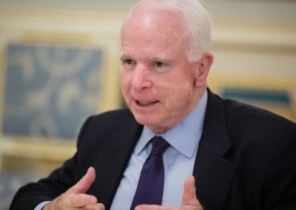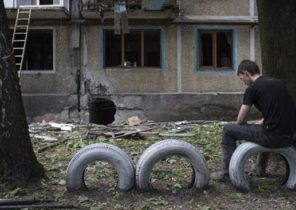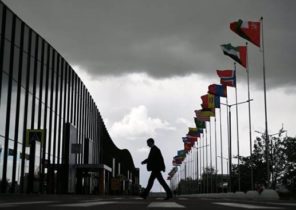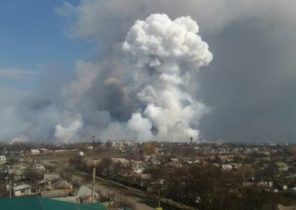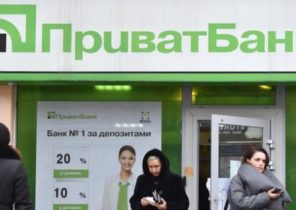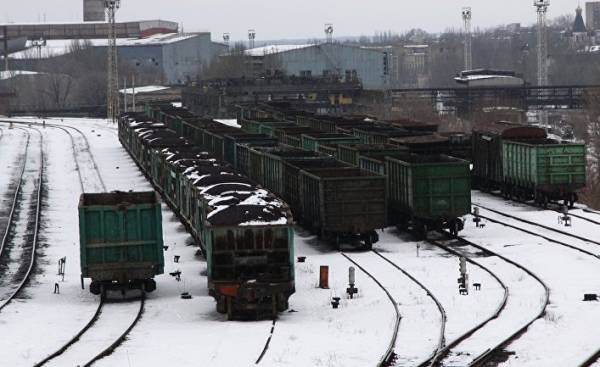
MOSCOW — Three years after the victory of Pro-Western revolution in Kiev three years ago the Ukrainian armed forces and Pro-Russian rebels fire at each other in the Eastern part of the country.
Every day through the front line conducted a massive shelling from multiple rocket launchers to the artillery fire, the number of dead in this trench warfare is about 10 thousand people.
But on the axis between the West and East of Ukraine is another movement, and the media covering the conflict, write about it far less often.
Because trucks and trains carry both legal and illegal goods from one part of the country to another, and the flow did not stop even when the fighting in the East of Ukraine was extremely violent.
But since the end of January a large-scale blockade, backed by veterans of the Ukrainian war put an end to the greater part of this trade.
“Thousands of cars are unable to pass into the occupied areas and back. Business owners, both Russian and Ukrainian oligarchs — not make a profit, and gangs of Donetsk and Lugansk do not receive your “taxes”, — the Deputy of the Ukrainian Parliament, one of the organizers semen Semenchenko describes the results of the blockade to date.
He noted that the notorious inefficiency of the Ukrainian state apparatus within two years tried to pass a law that would prohibit trade with the separatists, but to no avail. So activists took matters into their own hands.
Black billions
One of the main goods sent from Eastern Ukraine, is coal for power plants and steel mills — because the Donetsk and Lugansk generate most of the Ukrainian coal.
For the rebels in the Donbass, which receive both economic and military assistance from Russia, the export of coal is a crucial source of income.
According to the Ministry of energy of Ukraine, in 2015, from areas under rebel control, Ukraine had exported about 8.5 million tons of coal.
Less than half of the coal mined in the mines belonging to the richest Ukrainian man, oligarch Rinat Akhmetov, while the rest of the coal mined by the opaque structures, often associated with the leaders of the militia and organized crime, according to estimates of the Ukrainian magazine “New time”.
The price of one ton of this black gold is about 300 Danish kroner in terms of, i.e. this is a business worth many billions, enriching intermediaries on both sides of the front line, preferring to remain in the shadows.
The authorities of the breakaway republics in the major cities of Donetsk and Lugansk require, according to news Agency Interfax-Ukraine, a tax on coal exports to 47%, this source of income is critical to funding their war machine.
The split in Kiev
The blockade led to the creation of a kind of “iron curtain” not only between the Donbass and Ukraine.
The blockade separated the tares from the wheat in political debates in Kiev, where there are divergent views on the appropriateness of suspension of trading and the emergence of significant economic problems in this regard.
A number of politicians belonging to nationalist and populist opposition in the country, supported the organizers.
They believe that President Petro Poroshenko and his men slept when it was possible to step up military action in the East.
“We need to make clear the law on occupied territories, to impose martial law in Luhansk and Donetsk regions, and we will stop this arrogance — trade with the occupied regions”, — said the former Prime Minister Yulia Tymoshenko in an interview to Ukrainian TV.
Supporters of the embargo argue that Poroshenko, which is one of the richest people of Ukraine, and other oligarchs very well earn the continuation of trade with Pro-Russian rebels.
But a large part of official Kiev turned its back on the protesters, which the government viewed as a threat to supply Ukraine with energy resources and the threat to the economy of the country.
Because recently the Ministry of energy of Ukraine declared a state of emergency in the energy sector, and warned that it may need periodic blackouts if the blockade continues. According to the Ministry, the purchase of coal in other places, and not in the breakaway republics, will cost 30-40% more expensive.
The Ukrainian security service SBU warns that a total blockade will cause great harm and the state Treasury of Ukraine: according to the SBU, businesses operating in the East of the country, last year paid taxes to the Treasury for 10 billion crowns.
Volodymyr Fesenko, Director of the analytical center “Penta” in Kiev, believes that the blockade itself may solve the problems that have arisen in Donbass and Ukraine in General.
“This is a simplified solution to a very complex problem. Because although Donbas is divided in two, the infrastructure had a total” he says.
